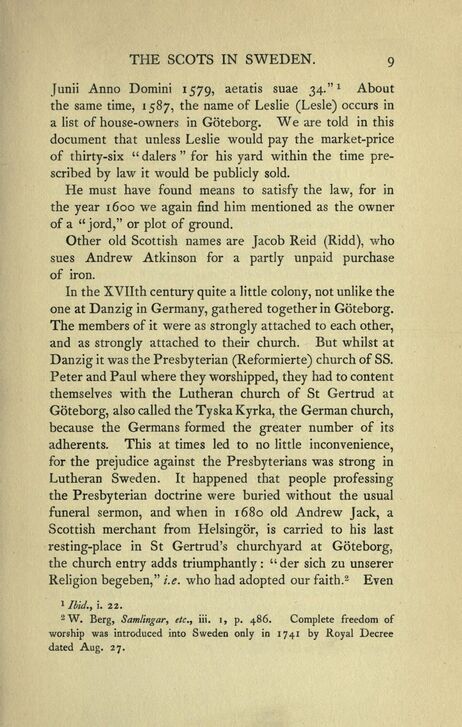
Full resolution (JPEG) - On this page / på denna sida - Sidor ...

<< prev. page << föreg. sida << >> nästa sida >> next page >>
Below is the raw OCR text
from the above scanned image.
Do you see an error? Proofread the page now!
Här nedan syns maskintolkade texten från faksimilbilden ovan.
Ser du något fel? Korrekturläs sidan nu!
This page has never been proofread. / Denna sida har aldrig korrekturlästs.
Junii Anno Domini 1579, aetatis suae 34.”1 About
the same time, 1587, the name of Leslie (Lesle) occurs in
a list of house-owners in Göteborg. We are told in this
document that unless Leslie would pay the market-price
of thirty-six “ dalers ” for his yard within the time
prescribed by law it would be publicly sold.
He must have found means to satisfy the law, for in
the year 1600 we again find him mentioned as the owner
of a u jord,” or plot of ground.
Other old Scottish names are Jacob Reid (Ridd), who
sues Andrew Atkinson for a partly unpaid purchase
of iron.
In the XVIIth century quite a little colony, not unlike the
one at Danzig in Germany, gathered together in Göteborg.
The members of it were as strongly attached to each other,
and as strongly attached to their church. But whilst at
Danzig it was the Presbyterian (Reformierte) church of SS.
Peter and Paul where they worshipped, they had to content
themselves with the Lutheran church of St Gertrud at
Göteborg, also called the Tyska Kyrka, the German church,
because the Germans formed the greater number of its
adherents. This at times led to no little inconvenience,
for the prejudice against the Presbyterians was strong in
Lutheran Sweden. It happened that people professing
the Presbyterian doctrine were buried without the usual
funeral sermon, and when in 1680 old Andrew Jack, a
Scottish merchant from Helsingör, is carried to his last
resting-place in St Gertrud’s churchyard at Göteborg,
the church entry adds triumphantly: u der sich zu unserer
Religion begeben,” i.e. who had adopted our faith.2 Even
1 Ibid., i. 22.
2W. Berg, Samlingar, etc., iii. i, p. 486. Complete freedom of
worship was introduced into Sweden only in 1741 by Royal Decree
dated Aug. 27.
<< prev. page << föreg. sida << >> nästa sida >> next page >>